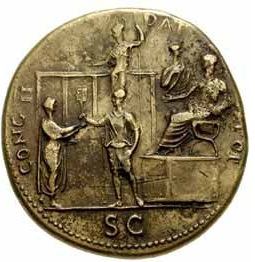Emperor Nero
Nero's reign has mostly been portrayed as a time of vice and tyranny.
Here is a table of events in the reign:
|
ad54 |
|
|
55 |
|
|
56 |
|
|
57 |
|
|
58 |
|
|
59 |
|
|
60 |
|
|
61 |
|
|
62 |
|
|
63 |
|
|
664 |
|
|
65 |
|
|
66 |
|
|
67 |
|
|
68 |
|

This sestertius from ad64 shows Nero (seated on the tribunal, right) with
the Praetorian Prefect Tigellinus beside him, whilst in the foreground an
official gives aid to a citizen. Minerva, the goddess of wisdom and
poetry watches in the background.
Links:
The following web pages will help you complete the task:
This document contains the relevant sections of the set
OCR Textbook.
You MUST read Mr Clare's article - The Singing Dilemma - on the historiography
And this article looks at the unpleasant subject So – did Nero commit incest with his mother?
Task
Our opinion of Nero's reign has been fatally damaged by the acounts of Tacitus and Suetonius - even though they are massively unreliable.
Imagine that Tacitus and Suetonius did not exist. Taking Fergus Millar's dictum (1977) that ‘the emperor was what the emperor did’ - i.e. using only the facts in the table - analyse the events to make FIVE comments on 'the reign of Nero'. Then click the yellow pointer to compare the comments that my pupils made:
- Analysis of the reign of Nero from the facts:
- • The Quinquennium: at first Nero ruled well - he promised the Senate in his first speech, he took measures to root out corruption, and he abolished indirect taxes on grain (which would help the poor). But was this Nero or - as Willian Smith (1849) said: 'the words of Seneca, uttered by the mouth of Nero'.
- • The reign BEGAN (first speech) by rejecting the way Claudius had ruled, and mocking Claudius (this involved also, therefore, a rejection of Agrippina's rule).
- • Seneca did NOT influence Nero towards democracy or republicanism; De Clementia shows that he believed in a benign absolute monarchy.
- • There was a streak of Panhellenism in Nero's reign - c.f. his performances, the Panhellenic Games, the abolition of taxes and the granting of devolution to Greece.
- • There seems to have been a
significant change of direction in Nero's reign after ad59 - possible
causes:
- Acte started his breach with his mother, ending with her murder
- increasing debauchery and profligacy (e.g Mulvian Bridge)
- Seneca and Burrus had failed him during the murder crisis
- his insistence on taking part in the Juvenalia was a mark of his over-ruling Seneca and Burrus
- he shaved his beard in ad59 (i.e. became an adult) and may have seen this as a defining moment
- it may just be a case of the power going to his head.